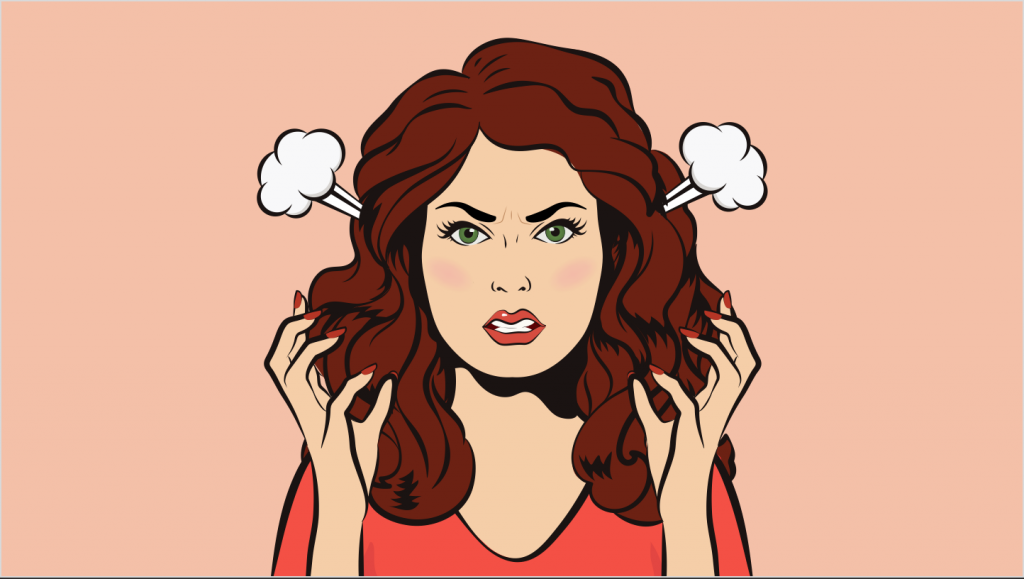Do You React Before You Think? Here’s Why You Shouldn’t

Hello, friends! Today we’re going to be talking about Emotional Dysregulation. So your first question is probably: What is Emotional Dysregulation?
But first, a little disclaimer: If you can relate to any of these signs, please do not take this feedback as an attack on your character. This article was meant to be a self-improvement guide for those of you who have been feeling a little stuck.
Have you ever had an unpredictable outburst, or reacted to something in a really bad way? Then you may have experienced emotional dysregulation. Simply put, it means you can’t control your emotions. This may be due to trauma or ADHD. Or maybe as a child not being taught how to handle your emotions.
Everyone remembers Will Smith’s drama at the Oscars, right? Where he stormed up on stage and punched host Chris Rock right in the face, shocking the world? That’s a perfect example of emotional dysregulation! When Chris Rock made a joke about Will’s wife, Jada Pinkett-Smith’s hair (when she has hair loss condition Alopecia), Will initially laughed. Then he noticed his wife was not amused, and a switch was flipped. That’s when Will’s emotions became dysregulated and he rushed on stage, assaulting Rock. This could possibly be the order of steps in emotional dysregulation and how it can manifest. Fine one minute, outburst the next. An obvious strategy to treat Emotional Dysregulation is therapy like Cognitive Behavioural Therapy (or CBT), but in this article, we’ll look at 3 other unique strategies so keep reading!
According to WebMD, Emotional Dysregulation can be defined as mood fluctuations or mood swings. This means that your emotions aren’t within the normal or acceptable way to react to things. For example: unreasonable expression of emotional outbursts like anger where something minor triggers into something more, becoming impulsive, having mental health issues like depression and anxiety, or even abusing substances and other self-harming behaviours. If not treated properly, emotional dysregulation can have an impact on your social life, work life, school life and relationships. Remember Will Smith? His actions have definitely harmed his career.
Negative impacts of being emotionally dysregulated.
Unusual Outbursts
Continuing with Will Smith and his unpredictable reaction. No one was expecting that behaviour, right?! That was someone who couldn’t control his behaviour in the moment.
Since we aren’t all celebrities at awards shows, a more relatable example of an emotional outburst is Flouncing. What’s flouncing?
Flouncing is an interesting type of unusual outburst and a way emotional dysregulation can manifest.
People should learn to control their emotions as they grow from teenagers to adults. But since a lot of our interactions these days take place online, this might not be happening anymore. We’re seeing more people having confrontations and dramatic outbursts on social media in forums, groups or communities and announcing that they are leaving these online spaces in an exaggerated way, for attention.
According to Urban Dictionary, flouncing is leaving an internet group or thread with exaggerated drama and acting in ways to draw attention to the drama. In other words, it is the internet equivalent of storming out of the room and making a dramatic exit, while slamming the door behind you on the way out.
In real-life conflicts, might feel sorry for the person who’s dramatically storming out of the situation because they’ve been wounded and hurt. Some people might even run after the aggrieved person and say, “No, don’t leave! Stay.”
In the world of the internet, it isn’t always possible to run after the party that is hurt, which makes the dramatic exit an ineffectual behaviour. When people throw a big enough tantrum and cause a scene — especially if they aren’t well-known to other group members — people’s reactions online are more likely to be: bye. Don‘t let the door hit you on the way out.
It turns out there is lots of psychological and neuroscience evidence to back up this behaviour.
Dramatic people want others to notice how upset, or sad, angry, anxious, and frustrated they are in order to come to their rescue, and there are two types of people in this world: those who avoid confrontation, and those who thrive on stirring the pot.
According to Science Alert, psychologists have come up with a scientific measurement scale called the “Need For Drama.” Researchers have found that those who scored higher on this scale shared three main characteristics: manipulation, outspokenness (aka gossip), and reactivity due to their internal perception of being a victim. Scientists also found that dramatic people tend to be more impulsive and, therefore, are more likely to jump into drama and tantrum mode.
But how does this affect us? Nicole Roberts from Forbes tells us that according to neuroscience, drama is another way of saying that someone lacks social and emotional skills, where there’s a disconnect between the two.
As socially-wired human beings, we love storytelling; it helps bond us together. But in today’s fast-paced world, we have limited time and shorter attention spans so we are becoming less patient. The way we communicate today through storytelling has changed. This has included some positive changes, such as the increase in TED Talks videos (and videos like ours at Psych2Go!), but on the flip side, our social interactions on digital platforms are filled with misinformation and gossip. As a social species, we all require attention. But social media has caused an excess in attention-seeking behaviours by its 24/7, all-pervasive availability, and psychologists believe that this behaviour is driven by emotional desperation.
When people’s beliefs, values, or ideals are threatened, instead of just removing themselves from the situation or quietly leaving, they instead become impulsive in their reactions and their expectation of the outcome. When we don’t get the attention we seek, we feel anxious, and to ease that anxiety, we instinctively seek more drama to get the attention we are craving.
But there is a downside to this drama: Stress. And we all know that’s harmful to our health.
According to Psychology Today, because conflict causes stress, which is our defence mechanism against perceived harm, it tells us one of two things: we’ve either been hurt or we’re about to be. If we think we’re hurt, our brain switches into action and causes us to be more impulsive or reactive.
We may not have control over our environment, but we do have control over how we react to it. So the next time you feel like the internet is against you, instead of angrily announcing “I’m leaving!” to a bunch of people who don’t really know you and probably don’t really care, save your energy.
You can learn the art of protecting your well-being and quietly shut the door behind you on your way out. How can you do that?
3 strategies to overcome Emotional Dysregulation
Let’s look at some ways to treat the damage emotional dysregulation and flouncing can cause. If you ever relate to being in a similar scenario like Will Smith, here are some tips you could potentially benefit from.
1) Develop Psychological Flexibility
According to Doctor of Psychology Marissa Berman, psychological flexibility can help with emotion regulation. She says, “Self-awareness is at the heart of developing psychological flexibility. Half of the battle is understanding current habits. Once you become aware of how you respond to various stimuli, you can start to change your behavior.”
2) Mindfulness
Mindfulness helps us be aware of our thoughts, feelings and behaviours. How does this help us manage our emotions? It calms us down and increases feelings of safety which stops the fight or flight response that can cause outbursts. It also gives us advance warning about our triggers so we can respond not just react. According to Dr. Ron Siegal, Assistant Clinical Professor of Psychology at Harvard Medical School, when we feel uncomfortable emotionally, we want to do things that make us feel better. But mindfulness teaches us how to be with our physical and emotional discomfort. When we are more comfortable with our uncomfortable emotions we are better able to control them.
3) STOPP method
If you’re having trouble controlling your emotions, try the STOPP technique which combines features of Cognitive Behavioral Therapy (CBT), Dialectical Behavioural Therapy (DBT) and mindfulness to help you manage your emotions when dealing with challenging or difficult or anger-causing situations.
According to PositivePsychology.com, the acronym stands for:
S – Stop!
- Remind yourself to take a moment and pause before reacting.
T – Take a Breath
- And notice your inhales and exhales
O – Observe
- Observe your thoughts, physical sensations and feelings.
P – Pull Back and Get Perspective
- Get a wider view of the situation. Step back and see the big picture. What’s a different way you can see what’s going on? You might ask yourself why do our reactions sometimes take over and get the best of us?
P – Practice What Works – Proceed
- How can I deal with the situation in a way that is best for me and others in a way that aligns with my core values? Where do our core values go when our emotions take over?
OUTRO
A professional therapist can give you strategies and exercises you can use to help regulate your emotions such as the STOPP exercise mentioned in this video. You can also journal your feelings and emotions to help distance yourself from your emotions in order to get perspective and make sense of them.
Have you learned something new that you can share with friends or family? Let us know! The references and studies used are listed below. Until next time, thanks for stopping by!
References
(n.a, n.d.) Urban Dictionary. https://www.urbandictionary.com/define.php?term=Flounce
(n.a., n.d) Dictionary.com. https://www.dictionary.com/browse/flouncing
(n.a)(2022, April 14) 5 Behaviors That Cause Drama (And How To Avoid Them). Power of Positivity https://www.powerofpositivity.com/5-behaviors-drama-avoid/
Castile, E (2016, May 5). How To Know You Have A Dramatic Personality. Bustle. https://www.bustle.com/articles/159109-6-signs-you-may-have-a-dramatic-personality
Crew, B (2016, April 6) Psychologists Have Come Up With an Official Test to Measure Your Need For Drama. Science Alert: https://www.sciencealert.com/psychologists-have-come-up-with-an-official-test-to-measure-your-need-for-drama
Roberts, N (2018, August 10), Your Brain On Drama: What Social Media Means For Your Personal Growth. Forbes https://www.forbes.com/sites/nicolefisher/2018/08/10/your-brain-on-drama-what-your-social-media-means-for-personal-growth/?sh=7a8696db7e91
Goodwin, J (2011 April 6) Under Pressure: Your Brain on Conflict. Why drama is bad for your brain. Psychology Today https://www.psychologytoday.com/us/blog/you-illuminated/201104/under-pressure-your-brain-conflict
Web MD contributors (2022, June 21) What Is Emotional Dysregulation? Web MD, https://www.webmd.com/mental-health/what-is-emotional-dysregulation
Phillips, R (2017, May 24) Four Ways Mindfulness Can Help Regulate Your Emotions Taylor Study Method Blog https://blog.taylorstudymethod.com/mindfulness-and-emotional-regulation/
Berman, M (2022, March 16) Developing Psychological Flexiblity. BetterUp https://www.betterup.com/blog/psychological-flexibility?hsLang=en
Ackerman, C (2018, Feb 5) 21 Emotion Regulation Worksheets & Strategies, Positive Psychology.com https://positivepsychology.com/emotion-regulation-worksheets-strategies-dbt-skills/
Tartakovsky, M (2012, May 2), 4 Journaling Exercises to Help You Manage Your Emotions, PsychCentral https://psychcentral.com/blog/4-journaling-exercises-to-help-you-manage-your-emotions#6






Responses